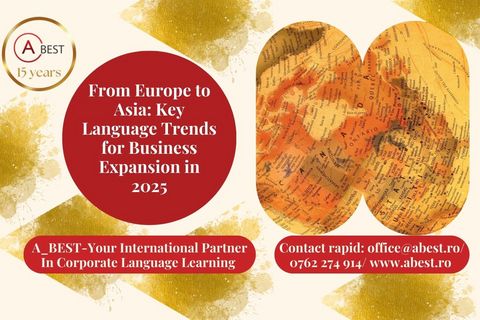Membres
From Europe to Asia: Key Language Trends for Business Expansion in 2025

As businesses continue to expand across borders, the ability to communicate effectively in multiple languages has become a crucial asset. In 2025, companies looking to establish a strong global presence are prioritizing language skills that align with emerging markets, technological advancements, and evolving workforce dynamics. From Europe to Asia, the following key language trends are shaping international business expansion.
1. The Continued Dominance of English
While English has long been the global lingua franca of business, its importance remains as strong as ever in 2025. International trade, diplomacy and technology rely heavily on English proficiency. “Companies expanding into European and Asian markets still expect employees to have a solid grasp of English for negotiations, marketing and corporate communications. However, businesses are also recognizing the need for multilingual proficiency to gain a competitive edge.”, states Aura Icodin, CEO & Founder of A_BEST Foreign Language Center, from Bucharest, Romania.
2. The Rise of Mandarin Chinese in Global Trade
As China's economy continues to grow, Mandarin Chinese is becoming an increasingly valuable asset for businesses. Professionals proficient in Mandarin are in high demand. Companies expanding into China or partnering with Chinese firms seek employees who can navigate business etiquette, regulations and cultural nuances in Mandarin.
3. Spanish and Portuguese for Latin American and European Markets
Spanish remains one of the most spoken languages worldwide and it is essential for businesses expanding into Latin America and parts of Europe. As trade agreements between the European Union and Latin American countries strengthen, Spanish proficiency is a key skill in international trade, customer service, and digital marketing.
Portuguese is also growing in importance, particularly due to Brazil’s economic influence. European companies looking to establish a presence in Brazil benefit significantly from Portuguese-speaking professionals who understand the country’s business landscape.
4. German: The Language of European Innovation
Fluency in German is a considerable advantage for businesses expanding into Germany, Austria, and Switzerland, as local companies often prefer to conduct business in their native language. Additionally, Germany’s emphasis on research and development makes German a key language in science and technology sectors.
5. Arabic for Middle Eastern Market Expansion
The Middle East remains a crucial hub for energy, finance and trade, making Arabic a strategic language for business expansion. Companies seeking opportunities in the UAE, Saudi Arabia and Qatar find Arabic proficiency valuable for building strong partnerships, navigating legal frameworks and understanding cultural expectations in the region.
6. The Growing Influence of Hindi and Regional Indian Languages
India’s rapidly expanding economy and digital transformation have increased the demand for Hindi. As multinational companies invest in India’s tech, manufacturing and service sectors, fluency in Indian languages enhances customer engagement and business operations.
7. The Role of Japanese and Korean in Tech and Entertainment
With Japan and South Korea leading in technology, gaming and entertainment industries, proficiency in Japanese and Korean is increasingly sought after. Companies looking to enter these competitive markets benefit from language skills that facilitate business negotiations, local partnerships, and market localization efforts.
Conclusion
In 2025, businesses expanding from Europe to Asia recognize that multilingual proficiency is no longer optional, it is a strategic necessity. While English remains a foundational language, Mandarin, Spanish, German, Arabic and other key languages are shaping the global business landscape. “Companies that invest in language training and hire multilingual talent will have a significant advantage in navigating international markets, fostering cross-cultural relationships and achieving long-term success in an interconnected world.”, added Aura Icodin.


